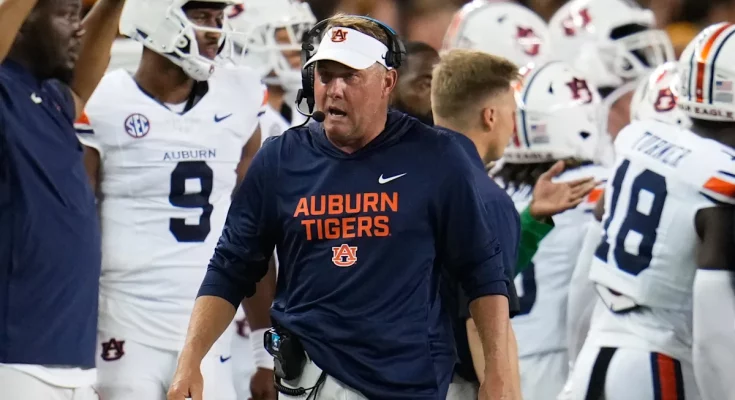When it comes to college football, the focus often shifts to statistics, rankings, and the opponents teams are about to face. Yet, for Auburn Tigers’ head coach Hugh Freeze, the lens is not on Ball State or any other team they may be slated to face in an upcoming game; it’s on the mindset, preparation, and mentality of his own squad. This perspective is crucial, because while a schedule can be plotted and opponents analyzed, the intangible qualities of focus, determination, and mental resilience often separate a good team from a great one. Freeze’s approach demonstrates a deeper understanding of what it truly takes to succeed in college football, beyond the X’s and O’s that dominate pregame analysis. His attention to the team’s mental state reflects a philosophy that champions internal growth and collective accountability, elements that can influence outcomes more than any playbook or pregame scouting report.
Freeze’s commitment to prioritizing Auburn’s mentality over the specific characteristics of Ball State underscores a subtle but significant shift in coaching strategy that has been emerging across college football. Rather than obsessing over the opponent’s tendencies, Freeze has invested his energy in ensuring that the Tigers maintain composure under pressure, embrace their roles, and internalize the culture of excellence that the program seeks to instill. This approach is rooted in the understanding that any team can have an off day or unexpected breakthrough; therefore, controlling what his team can control—their focus, intensity, and cohesion—creates a foundation that maximizes consistency and performance. By emphasizing mental readiness, Freeze is effectively empowering his players to handle any surprises that may arise during games. In doing so, he shifts the narrative from merely “beating Ball State” to cultivating a mindset where victories stem from preparation, discipline, and confidence in their own capabilities.
Another important aspect of Freeze’s focus on mentality is the recognition that college football is as much a psychological game as it is a physical one. Players are frequently under immense pressure, not only to perform on the field but also to balance academics, personal growth, and social dynamics that can impact their performance. Freeze’s method acknowledges these pressures and seeks to create an environment in which players can thrive mentally. By fostering a culture that values focus, accountability, and resilience, he reduces the likelihood that players will be derailed by external distractions or internal doubts. This philosophy also encourages players to adopt a proactive mindset, one that looks for solutions instead of dwelling on setbacks. In a sport where momentum shifts in seconds, the ability to stay mentally composed can be the difference between a win and a loss, and Freeze’s attention to this component reflects a modern and holistic approach to coaching.
Freeze’s strategy is also a testament to his long-term vision for the Auburn program. Rather than relying on the weaknesses of a specific opponent, he is working to develop a team identity that is resilient and adaptable. This identity-centered approach ensures that the Tigers are not merely reactive to their opponents’ strategies but instead proactive in creating their own opportunities. Players are encouraged to understand the value of consistency, not just in their physical performance but in their mental approach to each play, each series, and each game. This mindset allows them to approach challenges with clarity and confidence, knowing that preparation, focus, and collective discipline form the backbone of their performance. In essence, Freeze is cultivating a mentality that can withstand adversity, whether it comes from a highly ranked opponent or a team that may initially appear less formidable, such as Ball State.
Beyond tactical considerations, Freeze’s emphasis on mentality over opponent analysis carries profound implications for player development. Young athletes often face the temptation to measure themselves against their competition rather than focusing on personal and team growth. By redirecting attention to internal standards, Freeze instills a sense of responsibility and ownership among his players. They learn that their preparation, attitude, and effort matter more than external validation or the perceived strength of the opponent. This philosophy can be especially impactful in fostering leadership within the team. Players who internalize these principles are more likely to hold themselves and their teammates accountable, creating a culture of mutual support and high expectations that transcends the individual and strengthens the program as a whole.
It is also worth noting that Freeze’s mental-first approach reflects a broader trend in sports, where the psychological aspect of competition is increasingly recognized as a critical determinant of success. Coaches across college football and professional leagues alike have come to understand that a team’s mindset can be the most reliable predictor of performance under pressure. Mental toughness, focus, and confidence often determine how a team responds to setbacks, adjusts to in-game surprises, and executes under high-stress conditions. By prioritizing the Tigers’ mentality, Freeze is not only preparing his team for immediate games but also equipping them with skills and habits that will serve them throughout their careers. This forward-thinking perspective demonstrates a level of coaching sophistication that extends beyond conventional game planning.
The focus on mentality also allows Freeze to cultivate resilience in ways that rigidly structured tactical approaches cannot. Football games are inherently unpredictable; injuries, weather conditions, unexpected turnovers, and even officiating decisions can shift the course of a game in moments. A team that is mentally prepared is more likely to respond to these variables effectively rather than being thrown off course. Freeze’s attention to mindset ensures that Auburn players remain adaptable, maintaining clarity and purpose even in the face of adversity. This capacity for mental agility is particularly important for college athletes, who are still developing both on and off the field. By emphasizing psychological preparation, Freeze helps them build confidence that extends beyond football, fostering qualities like problem-solving, perseverance, and emotional regulation.
In addition to individual growth, Freeze’s approach strengthens the collective identity of the Auburn Tigers. Mental preparation is not a solitary endeavor; it relies on shared standards, communication, and trust among teammates. By focusing on mentality, Freeze promotes cohesion and mutual accountability, key ingredients for team success. Players learn to rely on each other, anticipate one another’s actions, and maintain a united front regardless of external circumstances. This emphasis on team-oriented mental toughness ensures that victories are not merely the result of individual talent but also of synchronized effort and shared commitment. In high-stakes games, the cohesion derived from a strong team mentality can create advantages that are not immediately apparent in statistical analysis but become decisive in crucial moments.
Freeze’s commitment to mental preparation over opponent-focused obsession also has a subtle but significant motivational effect. By redirecting attention away from Ball State’s record or perceived strengths, he removes the distractions that can create unnecessary pressure. Players are encouraged to concentrate on what they can control: their performance, preparation, and execution. This approach reduces anxiety and fosters a sense of purpose and agency. Athletes who internalize these values are more likely to play with confidence, composure, and clarity, turning potential stressors into opportunities for demonstrating resilience and skill. The focus on mentality effectively empowers players to take ownership of their actions, reinforcing the belief that preparation and mindset are the most reliable paths to success.
Importantly, this philosophy is not about underestimating opponents; it’s about fostering a sustainable, internalized approach to excellence. Ball State may be the upcoming challenge, but the principles that Freeze emphasizes—focus, resilience, discipline, and teamwork—prepare Auburn to meet any challenge, regardless of the opponent. By instilling these qualities, Freeze ensures that his players are ready not only for immediate games but also for the sustained demands of an entire season, where mental endurance can be just as critical as physical performance. In this sense, Freeze’s strategy cultivates adaptability, confidence, and readiness, equipping the Tigers to navigate both anticipated and unexpected challenges with poise.
As fans, analysts, and observers, it can be easy to fixate on scores, rankings, or opponent-specific matchups. Yet Freeze’s approach reminds us that the heart of competition lies within the players themselves—their preparation, mindset, and commitment to growth. By focusing on mentality rather than simply preparing for Ball State, Freeze demonstrates a holistic understanding of what it takes to achieve sustained success. His philosophy emphasizes the power of internal control, shared accountability, and resilience, offering lessons not only for athletes but for anyone striving to excel under pressure. It challenges the conventional wisdom that external factors are the most critical determinants of success and highlights the transformative potential of focusing on what we can control: our own mindset and effort.
For Auburn fans, this approach is particularly encouraging. While victories are never guaranteed, knowing that the team is being prepared with a strong mental foundation provides confidence that they can handle whatever the season throws their way. For younger players, it sets a tone that extends beyond individual games, shaping how they approach challenges in sports and life alike. It is a philosophy that prizes preparation, responsibility, and self-belief, cultivating a culture where players understand that their mindset is as important as any play they execute on the field.
The broader implication for the college football community is equally profound. Freeze’s emphasis on mentality over opponent fixation exemplifies a shift toward more holistic coaching methods that prioritize long-term development over short-term tactical gains. This approach underscores the importance of fostering environments where players can develop both physically and psychologically, where resilience and focus are valued as much as speed or strength. As the landscape of college athletics evolves, the teams that embrace this balance are likely to experience sustained success, not simply isolated victories. Freeze’s Auburn Tigers provide a case study in how cultivating mental toughness, cohesion, and adaptability can create a team that is prepared for both expected and unforeseen challenges.
For readers and fans of Auburn, there is also an invitation embedded in Freeze’s philosophy: to engage with the process, reflect on the team’s growth, and share insights. How do you see Freeze’s focus on mentality shaping the Tigers this season? What role do you think mental preparation plays in college football success, and how can fans recognize the impact of this approach during games? Sharing thoughts and perspectives not only deepens appreciation for the team’s efforts but also fosters a community that values reflection, analysis, and discussion. By commenting and participating in this conversation, fans can connect with the team’s journey in a meaningful way, celebrating victories and learning from challenges alongside the Tigers.
Ultimately, Hugh Freeze’s focus on Auburn’s mentality over Ball State is a powerful reminder that the foundation of success lies within the individuals and the culture they cultivate. By prioritizing mental resilience, discipline, and focus, he equips his team to face challenges with confidence, adaptability, and clarity. It is a philosophy that transcends simple game planning, emphasizing personal growth, collective accountability, and the transformative potential of mindset. For fans and observers, it offers a lens through which to appreciate the true heart of competition, encouraging engagement, discussion, and reflection on what it takes to achieve excellence. How do you see this approach playing out for the Tigers this season? Share your thoughts below and join the conversation about the evolving landscape of Auburn football under Hugh Freeze’s guidance.



